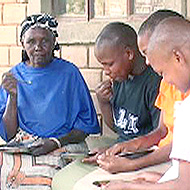|
In Kenya, HIV Orphans and Grandparents Live in Special Village
By Cathy Majtenyi, Voice of America
Kenya
August 6, 2008

Agnes Nzembi and her grandchildren
It is lunchtime for the Kametis. Agnes Nzembi and her four grandchildren exchange stories of the day.
They live in Nyumbani Village near the eastern Kenyan town of Kitui. But this is a different kind of village.
The Kametis and 28 other households are run by an elderly grandparent. The grandparent takes care of up to 11 children. Some of the youngsters are their biological grandchildren. The rest are children from other families.
Kavata Kameti says she enjoys living with her grandmother, "She tells me about our forefathers and things that happened in the past. Also she tells me about how to live a good life," she said.
All the young people in the village have one thing in common. Their low-income parents died of HIV/AIDS, turning them destitute and into orphans.
Sister Mary Owens, co-founder of Nyumbani Village, says the village grew out of a concern for the welfare of AIDS orphans and their elderly caregivers.
"These are two lost generations, because the grandparents have been left behind by their children, and the children have been left behind by their parents," she said."So there is a need to reach out to these grandparents. Secondly, this idea of trying to give these children as close experience of family as possible, we thought that the grandparents could do that, because they can hand out the values, they can share the culture, and they can guide."
During the day, the children attend primary school in the village.
When they are not studying, they work in the garden, cook, and do other chores.
Sister Owens says Nyumbani Village aims to be self-sustaining by growing its own food, cultivating income-generating plants such as castor and jatropha, creating its own water supply, and providing services to its residents.
"In a village, you have services, and we knew that if we could set up services like education and medical services at the clinic, and a polytechnic, then those services would be very accessible to the children," she said.
For grandmother Agnes Nzembi, living in Nyumbani is a dream come true.
"Before this, we were living in poverty," she said.
She says she is teaching her grandchildren to be responsible now so they will be responsible adults later.
More Information on World Health Issues
Copyright © Global Action on Aging
Terms of Use |
Privacy Policy | Contact
Us
|



